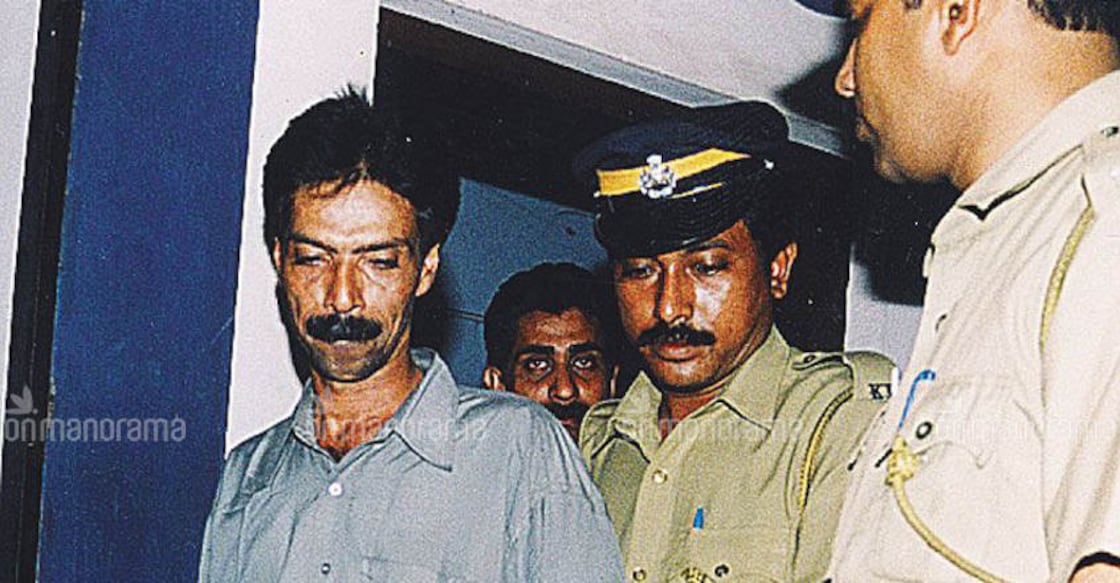How Kerala cops' out-of-the-box thinking brought a cold-blooded killer to justice

Mail This Article
Policemen in duty in the Aluva station received a call around 11 pm on January 7, 2001. Six members of the family in a house on the Pipe Line Road in the city have been murdered. They found Manjooran Augustine, aged 74, the owner of a hardware shop, in a pool of blood. His wife Baby, aged 42, son Jaymon, aged 14, daughter Divya, aged 12, mother Clara, aged 74 and sister Kochurani, aged 42, were also dead.
Close to the bodies of Augustine and Baby, the cops found an arrow sign on the wall drawn with blood. They all had been killed the previous night, a post-mortem report would reveal later.
The massacre hit the headlines. Augustine had amassed vast riches in the form of land, gold and hard cash. The police found assets worth lakhs of rupees from his bank locker.
An investigation team of 30 officers was formed under Ernakulam rural superintendent of police M Sethuraghavan. The investigators who questioned the relatives and neighbours of the victims were led to Antony, a relative of Augustine. The suspect had left Aluva the night of the crime and flew to Dammam via Mumbai.

'Mini telephone exchange'
Circle Inspector Chandrakshan followed Antony’s track to Mumbai and recovered the gold he had sold in the city. The ornaments had been taken from the victims. The police team could not fly to Saudi Arabia to arrest the suspect. They had to seek another measures.
Extraditing Antony to India was not easy because India had not signed a treaty with Saudi Arabia. The police officers had to think out of the box. They set up a mini telephone exchange in a shopping complex in Aluva. They took Antony’s wife Jemma to the exchange and made her read out the sentences the investigators had drafted. Jemma was put under surveillance so that Antony could not speak to her. She did not have access to any phones in the neighbourhood.
Circle Inspector B Sasidharan and deputy superintendent of police Abraham Cherian went to Mumbai and met Arun Memon, the travel agent who helped Antony fly to Saudi Arabia. Memon was asked to send a message to Antony’s sponsor in Dammam, saying that he was asked by Antony’s wife to bring the fugitive back. Antony’s sponsor agreed. Antony was taken into custody in the transit lounge of the Sahar airport.
The police team brought Antony to the Karipur airport on February 10. He was interrogated in a secret location between February 11 and February 17. His arrest was recorded on February 18 at the Kaladi Plantation Corporation guest house. Though Antony resisted the grilling initially, he later confessed to the crime after the policemen challenged him with the evidence they had collected.
The motive
Antony was a relative and family friend of Augustine. Augustine’s sister Kochurani had offered financial help for Antony to go abroad in search or work. He was a temporary driver with the Aluva municipality office then. When she backtracked on the offer, Antony became vengeful.
Antony reached Augustine’s house around 9 pm on the day of the murders. Augustine was about to go for a movie with his wife and children. After they had left, Antony asked Kochurani for the money she had promised. When she refused, he hacked her with a knife. Clara was also attacked when she tried to save her daughter. The killer then waited for Augustine and the others to return from the move. He knew that they could give him away.
The local police and the crime branch accused Antony of the murders. But the Kerala High Court referred the case to the Central Bureau of Investigation after the relatives expressed doubts if one man could kill six people. After spending months as a remand prisoner, Antony was granted bail. He worked in a shop in the private bus stand in Aluva in the meantime.
The CBI investigation confirmed the police finding. The trial started on October 18, 2004. The Ernakulam CBI court found Antony guilty. He was convicted of murder (IPC 302), theft (IPC 379), break-in with an intend to murder (IPC 449) and destruction of evidence (IPC 201). A total of 77 witnesses were examined. There were no eyewitnesses to the crime.
As many as 90 documents and 94 articles were produced before the court. The court dismissed the alibi presented by the accused as fake. Though Antony insisted that he was not desperate for money, the court rejected the claim after it found that he had borrowed Rs 10,000 at an interest rate of Rs 10 per month.
The CBI special court sentenced Antony to death on February 2, 2005. The Kerala High Court confirmed the order on September 18, 2006. The Supreme Court also confirmed the capital punishment after staying the order on a plea from Antony. Even the President rejected his petition for clemency.
Antony later approached the Supreme Court again and the court lessened the punishment to life imprisonment. He is housed in the Poojappura central jail.
Antony’s wife divorced him and moved out of Kerala along with her children. Someone bought his house later.
The Manjooran family’s house, the scene of the crime, was later demolished. Augustine’s hardware store has been rented out.

